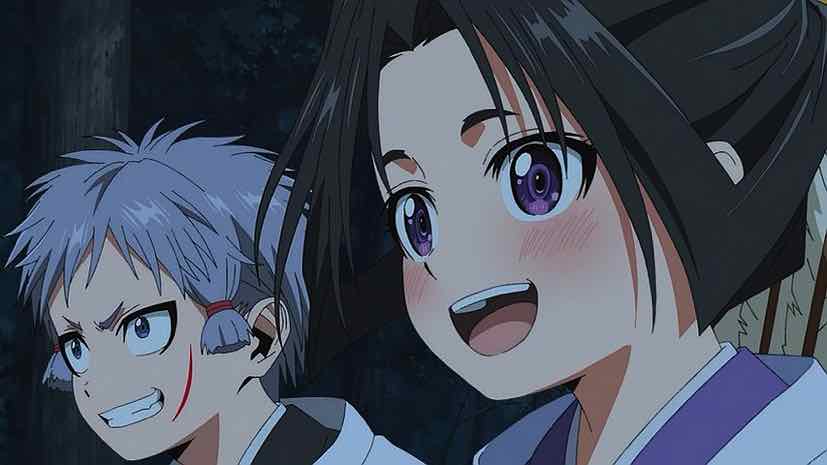Well, I’m obviously pretty pissed to be typing that. There was no announcement of any kind at the end of this episode of Nige Jouzu no Wakagimi. And the Occam’s Razor explanation for that is always “that’s it”. One and done. That does happen with WSJ adaptations, though not very often. I’d allowed myself to hope that the cursed star this series seemed to have been born under was finally exorcised. It got a terrific adaptation and a pretty massive bump in volume sales, and generated a lot of buzz. But now, crickets. The initial reports when the series was announced were that it was a split cour, but absent evidence to the contrary, we have to assume this is it.
That would seriously suck. For the record the adaptation used 32 of the manga’s existing 171 chapters, so source material could hardly be less of an issue. I can’t even really call what we got the prequel – that’s how far away we are from the real story kicking in. What was the point of putting in the effort – and money – for an adaptation that good? Worse still, if indeed this is it for the anime it’s likely that Jump will start pressing for the manga to end soon. Maybe Matsui Yuusei intended that anyway, maybe not. But despite his track record there’s no guarantee it’s going to be his choice. Anime has generally been unkind to Matsui, and while CloverWorks certainly did a wonderful cour, that doesn’t seem to have changed.
Under the circumstances it’s depressing to even talk about the episode itself. That it didn’t feel like a conclusion of any sort is hardly surprising. It focused mainly on Kojirou. He’s great, don’t get me wrong – but an important supporting character, not the hero. And this battle is extremely minor in the larger context of the story. I mean, this was fine – a good episode solidly in the series’ mainstream. But a bit of tacked-on narration doesn’t give it any sort of closure. It was just an episode.
In its context, this arc was about The Elusive Warriors establishing themselves as an actual fighting force. And planting the seed of a truly subversive (in a Bushido culture) idea : that it’s nobler to survive and harry your enemy another day than to march gleefully to your glorious deaths. In order for any of that to happen Tokiyuki has to become a leader who can actually fight (a process that’s been ongoing for a while). But as well, his followers must stake their claim to authority. Realistically to do that at their ages is a huge ask, but that’s where dramatic license comes in.
Kojirou is the reliable sideman, the constant. He doesn’t have any sort of gimmick or hook like the others – he’s just a little boy with integrity who’s preternaturally good at fighting and has a sense of military tactics. A child his age is a work in progress in any field of study, military affairs no exception. Stuff like the importance of learning the names of your men are lessons to be learned, and Kojirou is learning them on the fly.
Kojirou takes the responsibility of facing the enemy field commander, Wada Yonemaru (Takeda Kouji). The Elusives employ a series of tactics basically to buy time to allow the women and children to escape. They’re helped massively by the fact that Kiyohara constantly hinders Ichikawa with his strategic incompetence. This is why Fubuki chooses to wound Kiyohara’s pride rather than kill him – he might be the best asset the fleeing Hoshina army has. This was a common occurrence in feudal Japan – Imperial envoys were frequently the bane of the existence of the professional soldiers on whom their presence was foisted.
What Kojirou ultimately learns is the value of depending on the men under his command. He would never have bested Yonemaru without the likes of some kind of monster and not-bald guy. Kojirou has always been acutely aware of his limitations – he’s a small child trying to fight grown men twice his size. But there’s no shame in winning the way he did – a victory is a victory and the survival of the fleeing Suwa forces is what ultimately matters. And like a child should, Kojirou learns the lesson experience is trying to teach him (and expresses gratitude to Yonemaru for teaching it).
And that, unceremoniously, is basically that. Both the real history and Matsui’s fanciful take on it are just getting started, but that’s apparently as far as the anime is going with it. A read the manga ending is not something I expected with The Elusive Samurai – not this soon anyway, and not with the impressive sales bump the adaptation gave the manga. But I long ago gave up on trying to make sense of production committees – those are heads you really don’t want to get inside. It’s a scary place, and it smells like creative failure.
As painful as it is, all I can say is if you like Tokiyuki and find his story interesting, do in fact read the manga. It’s not flawless but the best is very much yet to come, and Matsui-sensei’s high points are some of the loftiest in shounen. His artwork is never less than impressive and occasionally downright stunning. I am happy that the one cour we got did the series justice – that’s better that than the alternative, certainly. A few hiccups aside this was a pretty great adaptation, one that didn’t just transplant the story to the screen but genuinely embellished it with flair and bursts of genius. But the sheer absurdity of it ending here is incredibly depressing. If an announcement comes tomorrow and all this teeth-gnashing will have been for naught, no one will be happier to have egg on their face than me.
The post Nige Jouzu no Wakagimi (The Elusive Samurai) – 12 (End) and Series Review appeared first on Lost in Anime.



